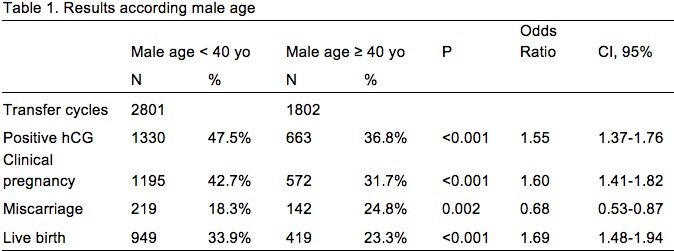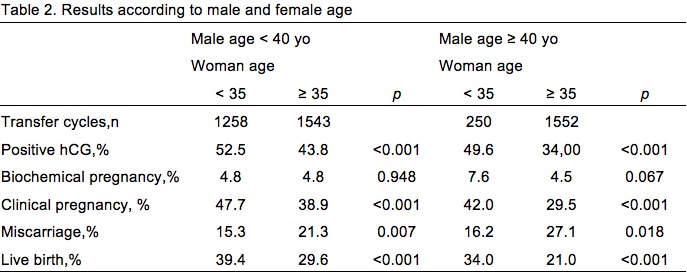Back
Poster, Podium & Video Sessions
Moderated Poster
MP34: Infertility: Therapy
MP34-10: Male Age in In Vitro Fertilization Results: Does It Matter?
Saturday, May 14, 2022
4:30 PM – 5:45 PM
Location: Room 225
Mariangela Badalotti, Isadora Badalotti-Teloken, Victória Campos Dornelles, Marta Ribeiro Hentschke, Fernando Badalotti, Natalia Vasconcelos, Alvaro Petracco, Claudio Teloken*, Porto Alegre, Brazil
- CT
Claudio Teloken, MD, PhD
Fertilitat - Reproductive Medicine Center, Federal University of Health Sciences of Porto Alegre
Poster Presenter(s)
Introduction: The advanced female age is well documented as a risk factor for pregnancy outcomes, whereas the impact of male age is still not well established in the literature. With the tendency to delay childbearing, understanding the actual effect of paternal age in fecundity becomes crucial. Some studies suggest that 40 years could be the milestone for declining male reproductive life, as is 35 years for women’s reproductive life. Thus, the objective of this study was to evaluate the impact of male age on gestational outcomes in In Vitro fertilization (IVF).
Methods: Retrospective, observational study that included a total of 4603 IVF cycles, between 2010 and 2020. Gestational outcomes in fresh embryo transfers (embryos from fresh oocytes inseminated with ejaculated sperm) were analyzed according to male age. Couples with men up to 69 yo and women up to 45 yo were included. Transfer cycles with embryo biopsy and donated gametes cycles were excluded. The men were divided into groups ( <40 yo and = 40 yo) and compared. Secondly, in each group, the women were also divided into two groups ( <35 yo and =35 yo), and the couple’s outcomes were compared. The variables analyzed were positive hCG, clinical and biochemical pregnancy, abortion and birth rates. The statistical analysis was performed using the Chi-square test, considering p<0.05 statistically significant.
Results: A total of 4603 IVF cycles carried out between 2010 and 2020 were analyzed. The results according to male's age < 40 yo and = 40 yo are shown in Table 1. The results considering the female age are shown in Table 2.
Conclusions: In this study, male age matters for IVF results. There were significantly more clinical pregnancy and live birth rates in males aged <40 years old. When considering maternal age, the male age seems to impact IVF results in women with < 35 yo and = 35 yo. Also, age less than 40 was presented as a protector factor for miscarriage.
Source of Funding: The authors had their own source of funding.


Methods: Retrospective, observational study that included a total of 4603 IVF cycles, between 2010 and 2020. Gestational outcomes in fresh embryo transfers (embryos from fresh oocytes inseminated with ejaculated sperm) were analyzed according to male age. Couples with men up to 69 yo and women up to 45 yo were included. Transfer cycles with embryo biopsy and donated gametes cycles were excluded. The men were divided into groups ( <40 yo and = 40 yo) and compared. Secondly, in each group, the women were also divided into two groups ( <35 yo and =35 yo), and the couple’s outcomes were compared. The variables analyzed were positive hCG, clinical and biochemical pregnancy, abortion and birth rates. The statistical analysis was performed using the Chi-square test, considering p<0.05 statistically significant.
Results: A total of 4603 IVF cycles carried out between 2010 and 2020 were analyzed. The results according to male's age < 40 yo and = 40 yo are shown in Table 1. The results considering the female age are shown in Table 2.
Conclusions: In this study, male age matters for IVF results. There were significantly more clinical pregnancy and live birth rates in males aged <40 years old. When considering maternal age, the male age seems to impact IVF results in women with < 35 yo and = 35 yo. Also, age less than 40 was presented as a protector factor for miscarriage.
Source of Funding: The authors had their own source of funding.



.jpg)
.jpg)